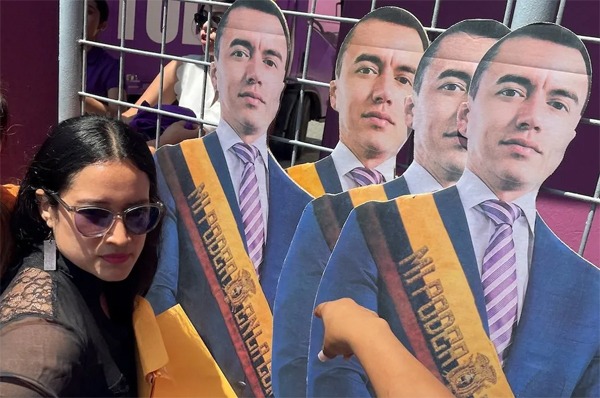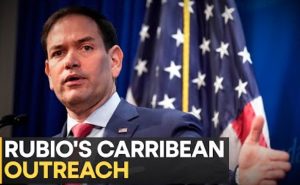Noboa’s Bid for Reelection Gains Momentum

Latin America Daily Briefing
Jordana Timerman
February 07, 2025
Ecuador holds presidential elections on Sunday. The race has been dominated by Ecuador’s security crisis — the country has faced rapidly escalating violence from transnational criminal organizations in recent years — as well as impactful energy shortages in the midst of an ongoing drought.
In order to win outright, a candidate must obtain more than 50 percent of the vote, or 40 percent and a ten point lead.
President Daniel Noboa is seeking reelection and leading in polls. He faces off against 15 contenders, including left-wing Correista lawmaker Luisa Gonzalez, his main competition in the last election. If nobody wins outright, a second round will be held on April 13.
Several polls point to a runoff between González and Noboa, while others have the president winning reelection in the first round, reports Reuters.
If the two candidates progress to a runoff, it would be a repeat of the 2023 presidential contest when Noboa emerged victorious with 52 percent of the vote to González’s 48 percent, notes AS/COA in an election briefing.
No other candidate polls above 3 percent, but contenders familiar from previous elections include the far-right Jan Topic, and Leonidas Iza, president of the country’s powerful Indigenous confederation CONAIE.
The vote is a referendum on Noboa’s governance thus far, he has been in office for just over a year, after winning snap elections called by his predecessor, reports Al Jazeera.
Noboa’s popularity “is buoyed by his branding as a hip and forceful leader, as well as by his truncated term — many voters don’t blame him for the country’s ills and say he needs more time,” reports the New York Times. González benefits from nostalgia for her political mentor, Rafael Correa’s tenure, but is also hurt by his controversial legacy.
Noboa enacted a state of “internal armed conflict” in response to gang violence that remains in place. Critics point to egregious human rights failures, including extrajudicial killings and the deaths of children taken into custody. (Guardian)
“In some ways, Noboa’s militarization of the prisons and the streets has worked. Homicides for 2024 were down by at least 15% from 2023. Killings in prisons were also down from previous years. But in other ways, the strategy has helped usher in the next phase of the conflict,” writes Steven Dudley at InSight Crime.
Indeed, the government’s “high-value targeting (HVT) has also created a perfect storm for violence to increase or persist,” according to the Brookings Institution. “Just like in Mexico, mid-level commanders in Ecuador have been vying for control, while the country’s criminal groups have splintered … The larger number of violent actors and within-group succession power struggles make mounting effective responses far more challenging.”
Security will be a major challenge for the election winner: dismantling the well-funded, highly connected operations of organized crime while restoring trust in government and revitalizing the economy will “require more than the militarization of police forces or the declaration of states of emergency; they demand systemic reforms,” according to the Atlantic Council.

Regional Relations
- U.S. border czar, Tom Homan, said he expects flights carrying Venezuelan migrants in the United States back to Venezuela to begin “within the next 30 days.” It’s the first indication of a timeline for the plan to send people back to Venezuela after U.S. President
Donald Trump’s announcement of a deal with Venezuelan leader Nicolás Maduro, reports the New York Times. (See Monday’s post.) - Inside the negotiations between the U.S. and Maduro, the Trump administration prioritizes migration and deporting Tren de Aragua members, while Venezuela’s government wants global sanctions lifted, reports Efecto Cocuyo.
- “The U.S. can still go beyond pragmatic deals, countering Maduro by using oil as the ultimate leverage,” argues José Ignacio Hernández in Americas Quarterly.
- Authoritarian inclined leaders around the world celebrated the shuttering of USAid. In the region, Nicaragua’s state media, controlled by the family of the president, Daniel Ortega, declared that “Trump turned off the faucet” for what they labeled “terrorists.” Venezuela’s interior minister, Diosdado Cabello, announced plans to investigate the agency, alleging that the “primary elections of the Venezuelan opposition were paid by the USAid”. And El Salvador’s Nayib Bukele, accused the agency of funding “opposition groups, NGOs with political agendas and destabilizing movements.” (Guardian)
- Autocrats are celebrating the U.S. move because “they understand what those seeking to dismantle the agency are desperate to hide from the American people: U.S.A.I.D. has become America’s superpower in a world defined by threats that cross borders and amid growing strategic competition,” writes Samantha Power in the New York Times.
- Trump’s strongarm tactics seem to have immediate results, but some experts are warning that in the long run they open the region up to China, which seems like a more stable partner in comparison to the U.S. (Los Angeles Times)
- Yesterday Panamanian President José Raúl Mulino insisted that U.S. State Department statements that U.S. government ships would not pay fees to transit the Panama Canal are false. “They are making important statements … based on a falsehood, and this is intolerable, quite simply intolerable,” he told reporters. He said he is scheduled to speak with Trump today. (Guardian)
Panama
- Panamanians are not united against Trump’s threats, writes Francisco Javier Bonilla in Nacla. Indeed, the U.S. imperialist threat has exposed divisions within the country over its relationship to China, the canal management in general, and an anti-nationalist business class.
Chile
- Chile’s pension reform is a win for President Gabriel Boric, but is also a testament to political compromise: “Overcoming legislative gridlock in today’s increasingly fragmented and polarized political climate required compromises from both sides. Two previous administrations attempted and failed to deliver a reform of this kind,” notes Cecilia Cifuentes in Americas Quarterly.
Mexico
- It’s unclear how much effect the 10,000 National Guard troops Mexico will deploy to the U.S. border will have, the decision “may be catering to Mr. Trump’s affinity for deal-making rather than being part of a well-thought-out military campaign,” reports the New York Times.
- “Weakening and dismantling the cartels should rank at or near the top of U.S. foreign policy priorities,” argues Will Freeman in the New York Times. “The problem with Mr. Trump’s plan to take them on is that it’s not tough or serious enough.”
- Mexican President Claudia Sheinbaum’s “Plan Mexico has been positively received by Mexico’s business community and elites, who see it as a key differentiator between her administration and that of her predecessor… However, the plan’s implementation will face serious challenges, both internal and external, and its results are likely to fall short of its stated goals,” writes Eduardo Arcos in World Politics Review.
El Salvador
- Bukele’s warm overtures to the Trump administration have put his iron-fist crackdown on crime back in the headlines. “This week, the Trump administration gave Bukele’s crackdown its blessing, with the secretary of state, Marco Rubio, showering El Salvador’s president with praise during a five-country tour of Latin America,” reports the Guardian.
Venezuela
- Venezuela’s “government has systematically shut down media outlets and enforced an information blockade, pushing journalists to develop new methods to reach audiences.” A new report by the Inter-American Dialogue “underscores the importance of decentralization, digital adaptation, and international collaboration to counteract these restrictions.”
Cuba
- Leonardo Padura writes a chronicle from Cuba where “hope is lacking and hurricanes and earthquakes are coming,” and the country “opens 2025 floating in a polycrisis and watching from the Havana Malecón to see what will come to us from ‘the turbulent and brutal North.’” (Le Monde Diplomatique)
Critter Corner
- “Palmerston, the cat who left the British Foreign Office in 2020, will come out of retirement and take up a new posting working with the governor of Bermuda,” reports the New York Times.
EnergiesNet.com 02 08 2025












